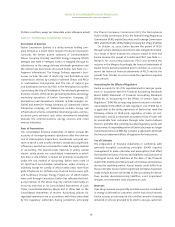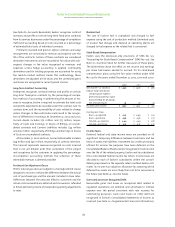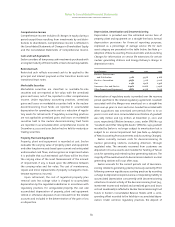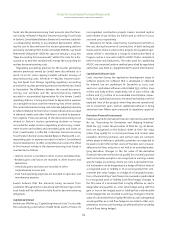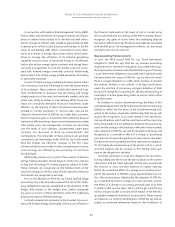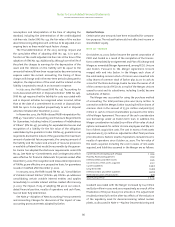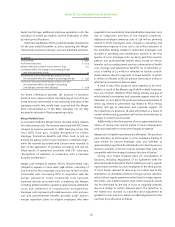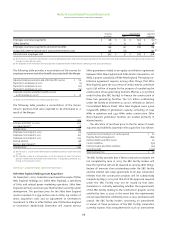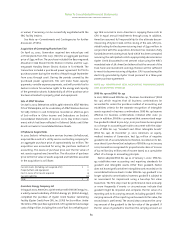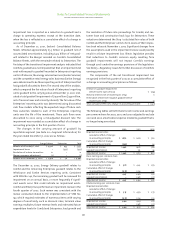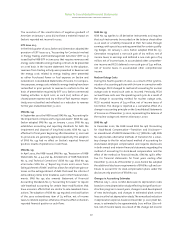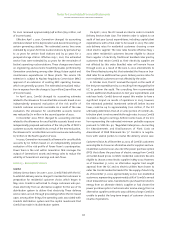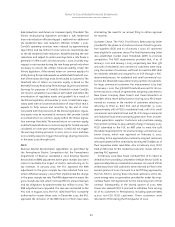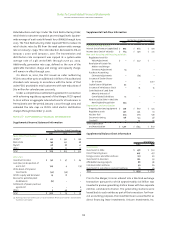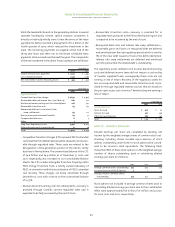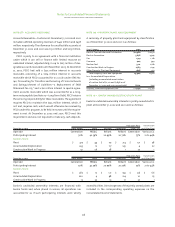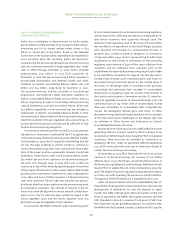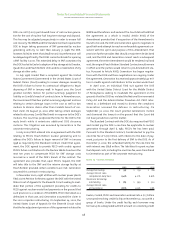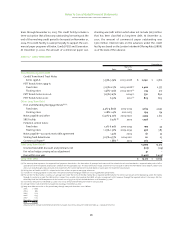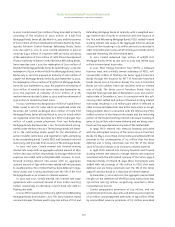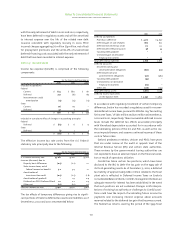ComEd 2002 Annual Report Download - page 93
Download and view the complete annual report
Please find page 93 of the 2002 ComEd annual report below. You can navigate through the pages in the report by either clicking on the pages listed below, or by using the keyword search tool below to find specific information within the annual report.
The cessation of the amortization of negative goodwill of
AmerGen on January 1, 2002 did not have a material impact on
Exelon’s reported net income for 2002.
EITF Issue 02-3
In the third quarter of 2002,Exelon and Generation adopted the
provision of EITF Issue 02-3, “Accounting for Contracts Involved
in Energy Trading and Risk Management Activities” (EITF 02-3)
issued by the FASB EITF in June 2002 that requires revenues and
energy costs related to energy trading contracts to be presented
on a net basis in the income statement. Prior to the adoption,
revenues from trading activity were presented in Revenue and
the energy costs related to energy trading were presented
as either Purchased Power or Fuel expense on Exelon and
Generation’s Consolidated Statements of Income. For compara-
tive purposes, energy costs related to energy trading have been
reclassified in prior periods to revenue to conform to the net
basis of presentation required by EITF 02-3. Exelon commenced
trading activities in April 2001, as such $207 million of pur-
chased power expense and $15 million of fuel expense, respec-
tively, was reclassified and reflected as a reduction to revenue
for the year ended December 31, 2001.
SFAS No. 144
In September 2001,the FASB issued SFAS No.144,“Accounting for
the Impairment or Disposal of Long-Lived Assets”(SFAS No.144).
Exelon adopted SFAS No. 144 on January 1, 2002. SFAS No. 144
establishes accounting and reporting standards for both the
impairment and disposal of long-lived assets. SFAS No. 144 is
effective for fiscal years beginning after December 15, 2001 and
its provisions are generally applied prospectively. The adoption
of SFAS No. 144 had no effect on Exelon’s reported financial
position, results of operations or cash flows.
SFAS No. 145
In April 2002, the FASB issued SFAS No. 145, “Rescission of FASB
Statements No. 4, 44 and 64, Amendment of FASB Statement
No. 13, and Technical Corrections” (SFAS No. 145). SFAS No. 145
eliminates SFAS No. 4 “Reporting Gains and Losses from
Extinguishment of Debt”and thus allows for only those gains or
losses on the extinguishment of debt that meet the criteria of
extraordinary items to be treated as such in the financial state-
ments. SFAS No. 145 also amends Statement of Financial
Accounting Standards No. 13,“Accounting for Leases” to require
sale-leaseback accounting for certain lease modifications that
have economic effects that are similar to sale-leaseback trans-
actions.The adoption of SFAS No. 145 required a reclassification
of the 2000 extraordinary item of $4 million, net of income
taxes, to interest expense;otherwise,it had no effect on Exelon’s
reported financial position or cash flows.
SFAS No. 133
SFAS No. 133 applies to all derivative instruments and requires
that such instruments be recorded on the balance sheet either
as an asset or a liability measured at their fair value through
earnings,with special accounting permitted for certain qualify-
ing hedges. On January 1, 2001, Exelon adopted SFAS No. 133.
Generation recognized a non-cash gain of $12 million, net of
income taxes, in earnings and deferred a non-cash gain of $4
million, net of income taxes,in accumulated other comprehen-
sive income and PECO deferred a non-cash gain of $40 million,
net of income taxes, in accumulated other comprehensive
income.
Nuclear Outage Costs
During the fourth quarter of 2000, as a result of the synchro-
nization of accounting policies with Unicom in connection with
the Merger,PECO changed its method of accounting for nuclear
outage costs to record such costs as incurred. Previously, PECO
accrued these costs over the operating unit cycle. As a result of
the change in accounting method for nuclear outage costs,
PECO recorded income of $24 million, net of income taxes of
$16 million. The change is reported as a cumulative effect of a
change in accounting principle on the Consolidated Statements
of Income as of December 31, 2000, representing the balance of
the nuclear outage cost reserve at January 1, 2000.
SFAS No. 148
In December 2002, the FASB issued SFAS No. 148, “Accounting
for Stock-Based Compensation—Transition and Disclosure—
an amendment of FASB Statement No. 123” (SFAS No. 148). SFAS
No. 148 provides alternative methods of transition for a volun-
tary change to the fair value based method of accounting for
stock-based employee compensation and requires disclosures
in both annual and interim financial statements regarding the
method of accounting for stock-based compensation and the
effect of the method on financial results. SFAS No. 148 is effec-
tive for financial statements for fiscal years ending after
December 15,2002.As of December 31,2002,Exelon has adopted
the additional disclosure requirements of SFAS No.148 and con-
tinues to account for its stock-compensation plans under the
disclosure only provision of SFAS No.123.
Changes in Accounting Estimates
Effective July 1, 2002, ComEd decreased its depreciation rates
based on a new depreciation study reflecting its significant con-
struction program in recent years,changes in and development
of new technologies, and changes in estimated plant service
lives since the last depreciation study.The annualized reduction
in depreciation expense, based on December 31, 2001 plant bal-
ances, is estimated to be approximately $100 million ($60 mil-
lion, net of income taxes). As a result of the change, net income
Notes To Consolidated Financial Statements
exelon corporation and subsidiary companies
91


